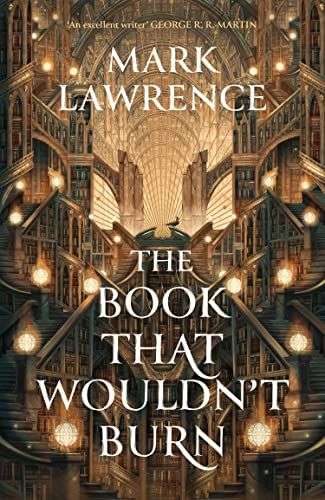We’ve implemented some new protocols around sending us messages via this website. Please email website “at” britishfantasysociety “dot” org for any issues.

For all things fantasy, horror, and speculative fiction
-
Announcement:

The Book That Wouldn’t Burn
THE BOOK THAT WOULDN’T BURN by Mark Lawrence from @HarperVoyagerUK #BookReview #Fantasy
HarperVoyager. h/b. £16.99.
Reviewed by Elloise Hopkins.

Livira lives in the dust, on the outskirts of the Amthane Empire, tantalisingly in view of the mountain and capital city she has never visited, though she intends to… one day. The water in the well keeps her kind alive, but it has not escaped Livira’s notice that the water level in the well only ever decreases. Other things are happening. Last month Orrin disappeared. No one knows why. Now, in this place where no one ever comes, Livira sees a figure in the distance. Her life will never be the same again.
Livira’s dreams of leaving for the capital may yet be realised in ways she had never imagined, though it will come at the cost of everyone and everything that was familiar to her. First, sabbers, then a gruff, foul-mouthed soldier, will be her salvation from the dust and the life she was trapped in. It will not be easy, though, like her namesake, the weed, Livira is nothing if not determined.
Evar has known nothing but the library his whole life. The library. Vast, endless chambers of knowledge, much of which is out of his reach. The library and his strange and small family, some of whom would kill him given even a small reason. The library, his family, and the assistant and the soldier – animated, statuesque servants of the library that are at times more hindrance than a help. Evar does not remember all of his past, and he certainly does not understand all of his present. One thing is sure: not everything will remain the same forever.
The Book that Wouldn’t Burn opens a remarkable new series from an author we know will deliver rich prose and a thought-provoking narrative, and it does just that. The library itself is almost too large and too complex, and too astonishing to be believed. Lawrence keeps its secrets largely out of reach, allowing the imagination to run riot and the possibilities to be endless. Livira and Evar become tangled in its intrigues, and as the narrative unfolds, we realise we are watching a world that exists in an infinite cycle of conflict, destruction and recovery, with frighteningly jarring parallels to our own.
Both characters take on point-of-view roles, and we are immersed in their journeys of discovery, heartbreak and realisation as their worlds collide and clash. Above all, this is a story that explores differences and prejudice. It is a slow burner, with much time spent – and needed – to try to comprehend the library and its mysteries, as well as those who control it. Whilst the narrative voice and the lighter moments among the dark are clearly recognisable, this series is notably different to the author’s previous work.
We still have the darkest aspects of humanity laid bare amid the bigger picture of change. We have those questions of why destruction was necessary and how people are going to survive and heal afterwards. The rest of The Library Trilogy to come promises more of this exploration on a grand scale. It is clearly a series designed to make us think, to make us question our own actions and convictions, and we feel every conflict and loss along with its characters, as well as every optimistic moment of hope.
Explore the blog:
Blog categories:
Latest Posts:
Tags:
#featured (56) #science fiction (25) Book Review (264) events (44) Fantasy (231) Graphic Novel (13) horror (136) Members (62) Orbit Books (48) profile (43) Romance (17) Science Fiction (50) short stories (28) Titan Books (52) TV Review (15)
All reviews
Latest Reviews:
- THE HOUSE ON THE BORDERLAND by William Hope Hodgson
- Monstrum by Lottie Mills
- Mood Swings by Dave Jeffery
- Yoke of Stars by R.B. Lemberg
- Hera by Jennifer Saint
- The Black Bird Oracle by Deborah Harkness
- RETURN OF THE DWARVES By Markus Heitz
- Delicious in Dungeon
- Toxxic by Jane Hennigan
- THIS ISLAND EARTH: 8 FEATURES FROM THE DRIVE-IN By Dale Bailey
Review tags:
#featured (2) Action (4) Adventure (4) Book Review (28) Fantasy (18) Featured (2) Feminist (2) Gothic Horror (3) Horror (14) Magic (3) Orbit Books (3) Romance (6) Science Fiction (5) Swords and Sorcery (2) Titan Books (7)